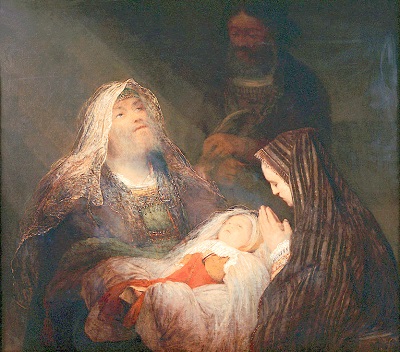
Simeon's Song of Praise (Nunc Dimittis)
Aert de Gelder, 1710
My dear friends,
In Luke 2:25-32, we are introduced to Simeon, a devout and righteous man in Jerusalem, who had been promised by the Holy Spirit that he would not die before he had seen the Lord's Messiah. Moved by the Spirit, Simeon comes to the temple just as Mary and Joseph bring in the infant Jesus for his customary Jewish rites. Upon seeing Jesus, Simeon recognizes Him as the fulfillment of God’s promise, not only to himself but to all people. He takes Jesus in his arms and, overwhelmed with prophetic insight and gratitude, praises God. He declares Jesus as the long-awaited salvation, a light for revelation to the Gentiles and glory for Israel. This sets the stage for Simeon’s subsequent prophecy in Luke 2:33-35, which speaks to the impactful and challenging journey that lies ahead for Jesus and those connected to Him:
Then Simeon blessed them and said to his mother Mary,
"This child is destined for the falling and the rising of many in Israel,..."
- Luke 2:33-34a
This prophecy reflects the divisive impact Jesus' ministry would have on Israel. In the Jewish context of the time, expectations of the Messiah were often centered around political liberation and restoration of Israel's national glory. However, Jesus' teachings and actions challenged these expectations and the religious status quo. The "falling" and "rising" metaphorically signify how people's responses to Jesus' message would determine their spiritual fate – leading to either rejection and downfall ("falling") or acceptance and salvation ("rising").
This statement serves as as a reminder of the transformative power of truth and moral integrity. Jesus' teachings continue to challenge societal norms, personal beliefs, and behaviors. The way individuals respond to these challenges can lead to personal growth and enlightenment ("rising") or resistance and moral decline ("falling"). It encourages introspection and a willingness to be transformed by spiritual truths.
Regularly engaging in self-reflection and meditation enables us understand our responses to life's challenges, being open to changing perspectives and beliefs that no longer serve our spiritual growth. Cultivating humility will enable us to learn from "falling", and cultivating gratitude will enable us to appreciate the "rising."
- Luke 2:34b-35a
In Jesus' time, this statement predicted that he would be a contentious figure, facing opposition from various religious and political groups. His teachings and actions, often contrary to the established norms, would not only cause conflict but also reveal the true intentions and character of those around him. The opposition to Jesus would serve as a litmus test for the hearts and minds of people, revealing their true nature.
Even today, standing for truth and justice, as exemplified by Jesus, often invites opposition. Societal or personal reactions to moral and ethical challenges reveal much about collective and individual characters. This speaks to the ongoing struggle for justice and righteousness in our world and challenges us to examine our reactions to such issues.
When facing opposition or conflict, instead of reacting defensively, we can use it as an opportunity to explore our inner thoughts and feelings. We can practice mindfulness to observe our reactions non-judgmentally and seek to understand the perspectives of others, fostering empathy and compassion.
- Luke 2:35b
This poignant prophecy was directed to Mary, Jesus' mother, foretelling the deep sorrow and suffering she would endure, particularly in witnessing Jesus' crucifixion. The "sword" symbolizes the intense emotional and spiritual pain that Mary would experience as a result of her son's life and death, a path marked by misunderstanding, rejection, and ultimately, crucifixion.
This saying reflects the universal experience of suffering, especially the pain that comes from witnessing the suffering of loved ones. It speaks to the deep empathy and emotional bonds that connect us, and the inevitable heartache that comes with deep love and compassion. This can serve as a reminder of the human capacity for empathy and the profound impact our actions can have on others.
Suffering, especially emotional or spiritual, is often an integral part of the human experience and spiritual journey. Accepting this can lead to deeper empathy, compassion, and understanding. Personal growth often involves facing pain and learning from it, rather than avoiding it.
In times of suffering, we should cultivate a practice of compassion, both for ourselves and others. This could involve practices like loving-kindness meditation, prayer, or engaging in acts of kindness. Learn to sit with discomfort and pain, using it as a ground for developing deeper emotional and spiritual resilience.
Simeon's prophecies encourage us to embrace life's transformative processes, learn from opposition and conflict, find strength and compassion in suffering, and integrate diverse spiritual practices for a well-rounded approach to personal growth and development.